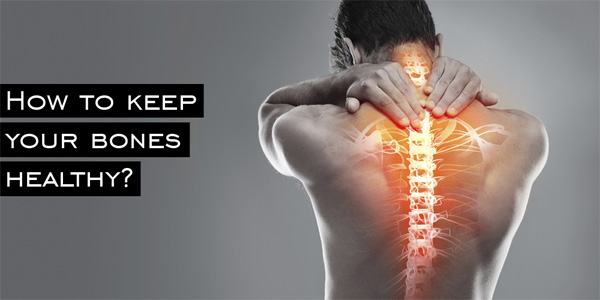Bones play crucial roles in our body – they provide structure, protect organs, secure muscles and are a storehouse for calcium. It’s important that during childhood and adolescence we build strong and healthy bones through a good diet and an active lifestyle. As time passes and we age, we are at risk of developing osteoporosis. It is a condition that causes the bones to weaken and become brittle. This can result in painful fractures of the hip, wrist or spine. Early prevention can reduce the risk of developing osteoporosis and other degenerative bone diseases.
Why is bone health important?
Your bones are continuously changing — a new bone is made and an old bone is broken down. When you are young, your body makes new bones faster than it breaks down old bones and your bone mass increases. You reach the peak of bone mass around the age of 30. After that the remodeling of bones continues but you lose slightly more bone mass than you gain. Your likelihood to develop osteoporosis depends on how much bone mass you attain by the time you reach 30 years of age and how rapidly you lose it after that.
Our skeletal system is composed of 206 bones and plays one of the most important functions in the body: to provide overall structure and to protect all the organs. However, the care and maintenance of this powerhouse is often neglected or completely forgotten.
How to take care of your bones:
- Understand osteoporosis risk factors
This disease of the bones causes weakening of the bones. Various factors like age, gender, family history, race, body type, menstrual history, and personal lifestyle and history can make certain patients more susceptible to osteoporosis. Get yourself checked. - Test bone mineral density
A quick and painless test, called a DEXA scan, measures bone strength. - You need calcium
A diet low in calcium contributes to diminished bone density, early bone loss and an increased risk of fractures. A calcium enriched diet ensures bone strength and minimizes osteoporosis. - Vitamin-D requirements
Vitamin D too plays a major role in preventing and minimizing osteoporosis, but most patients are deficient in the same. Vitamin D helps absorb calcium in the gastrointestinal tract and transfers it to the bones (reabsorption). - Follow a Healthy Diet
Consult a nutritionist and follow a diet that helps protect bone density. A diet rich in vegetables, fruit, legumes and moderate consumption of dairy works well. - Exercise always works
Choose an activity you enjoy and build a regular fitness regime. Jogging, walking, dancing, hiking, playing volleyball or tennis is good for your bones and also promotes overall physical and mental health. - Say no to Tobacco and excessive alcohol use
Smoking increases the risk of osteoporosis by reducing blood flow to the bones, slowing the production of bone-forming cells and impairing calcium absorption. Excessive alcohol consumption makes you more prone to bone loss than those people with minimal alcohol intake.
What affects the bone health?
As you age, your bones become thinner and lose their density. Over time, you become more prone to injuries. The thinning of bones is called osteopenia and it can be halted with some precautions.
Some dietary changes for Healthy Bones:
- Follow a calcium rich diet consisting of dark leafy green vegetables, broccoli, parsley, sweet potatoes, almonds, dried figs, fortified tofu and soy milk.
- Check with your doctor and start calcium supplements if needed. Most individuals need it as the need for calcium increases as you age.
- A Vitamin D deficiency is connected to an increased risk of fractures. Sun exposure without sunburn is the main and most natural way to get Vitamin D. Expose the face and arms to sunlight without sunscreen for about twenty minutes two to three times per week.
- Refined sugar, alcohol and caffeine are acid-forming foods that weaken the bones by depleting them of calcium and other minerals. Reduce intake as much as possible.
We at KDAH have a specialised centre of excellence dedicated to bone and joint heath. Our team of specialists assists patients with timely diagnosis and immediate action. Do visit the below link for further details:
https://www.kokilabenhospital.com/departments/centresofexcellence/centrefor_boneandjoint.html


